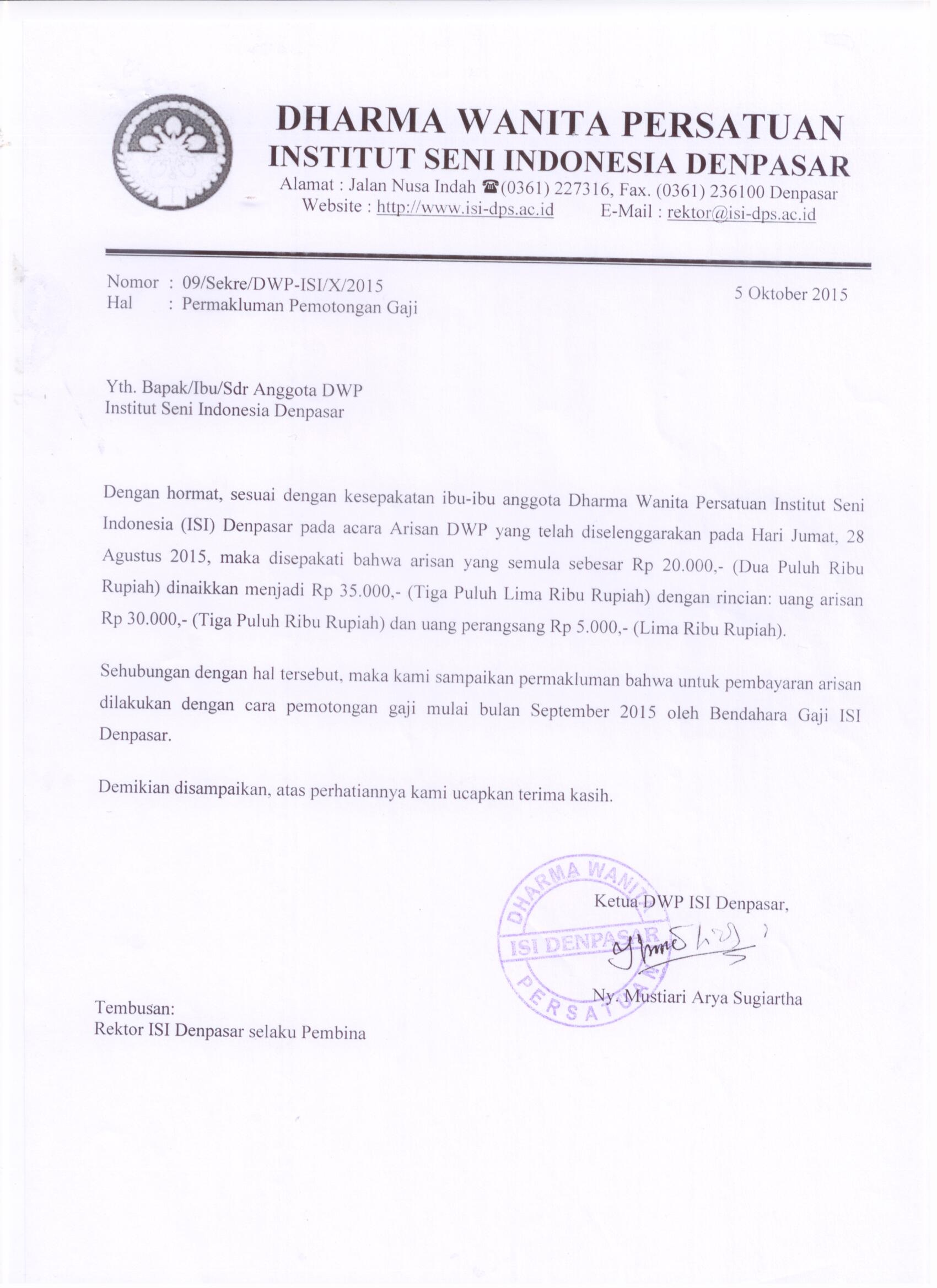
by admin | Oct 23, 2015 | Artikel
Kiriman : Ni Ketut Dewi Yulianti,S.S.,M.Hum
Abstract
This paper is intended specially for the students of Darmasiswa RI program who study at ISI ( Institut Seni Indonesia/ The Indonesian Institute of the Arts) Denpasar who need to master Bahasa. Bahasa will help them in getting the lesson more easily and in communicating with the society more confidently.
Some steps are recommended in this paper. And before having speaking skill, listening skill becomes an important skill besides writing and reading ones. Mastering cross cultural understanding is also a need for learners as language and culture are inseparable. Understanding about the culture of Indonesia will minimize misunderstanding due to cultural differences.
I.INTRODUCTION
This paper is aimed at describing the steps in learning Bahasa, especially for the students of Darmasiswa RI program who study at ISI ( Institut Seni Indonesia/ The Indonesian Institute of the Arts) Denpasar. Understanding the language, in this case bahasa Indonesia (Indonesian language) will be fun when learners feel its importance and significance.
Fisrt of all, let us discuss about why the students should learn Bahasa. By mastering Bahasa, the students will be able to attend the class and get lesson more easily and they will also be able to communicate with the society more confidently.
The students will be able to speak Bahasa well, after doing some steps described in this paper. In learning Bahasa as learning other languages, before having speaking skill, listening skill becomes an important skill besides writing and reading ones. In addition to those four skills, learners are expected to master a cross cultural understanding as well. Cross cultural understanding simply refers to the basic ability of people to recognize, interpret and correctly react to people, incidences or situations that are open to misunderstanding due to cultural differences.
The problem under concern is what steps should be undergone by learners in attaining their intention to master Bahasa?
II.ANALYSIS
In general, when students want to learn Bahasa, they have to start from understanding words, sound changes in complex words, words-forming processes, affixes, phrases, clauses, and sentences before building a speech. (see Sneddon,1996: 8).
WORDS
Words can be simple or complex. A word can be complex in a number of ways. It can consist of reduplicated bases, such as buku-buku ‘books’, rumah–rumah ‘houses’, etc.
PHRASES
A phrase is a group of words which is grammatically equivalent to a single word, being able to occur in the same place as that word. Example: Kedua buku ini ‘these two books’.
CLAUSES
A clause is a construction which contains a predicate and, with some minor exceptions, a subject. A clause is either independent or dependent. Example: Dia guru ‘She/he is a teacher’.
SENTENCES
A sentence is a construction which is grammatically complete; it can stand alone as a complete utterance (although it may be closely linked to what has gone before). A sentence expresses a statement, question, command, or exclamation. Apakah dia sudah makan? ‘Has she/he eaten?’
After understanding how the words, phrases, clauses, sentences are used, learners should also learn about the culture of Indonesia, since language and culture are inseparable, and by understanding the culture will help them to communicate nicely without misunderstanding. Practice makes perfect. The best way of improving the fluency in speaking Bahasa is by practicing a lot.
III. CONCLUSION
In general, when students want to learn Bahasa, they have to start from understanding words, sound changes in complex words, words-forming processes, affixes, phrases, clauses, and sentences before building a speech. Besides, they also should understand about the culture of Indonesia because cross cultural understanding plays a significant role in communication. When the students learn Bahasa, at the same time they should learn about the culture of Indonesia.
Bibliography
Reynolds, Sana & Deborah Valentine. 2004. Guide to Cross-Cultural Communication. New Jersey: Pearson Education
Sneddon, James Neil. 1996. Indonesian Reference Grammar. Australia: Allen & Unwin Pty Ltd

by admin | Oct 21, 2015 | Artikel
Kirimin : Ni Ketut Dewi Yulianti,S.S.,M.Hum

Abstract
This paper is intended for those who want to learn languages. Realizing that language and culture are inseparable, when learners learn a language, then at the same time they should learn the culture of the country where the language is from, besides learning to master the four skills namely speaking skill, listening skill, writing skill and reading skills. Cross cultural understanding simply refers to the basic ability of people to recognize, interpret and correctly react to people, incidences or situations that are open to misunderstanding due to cultural differences. There are some guidelines to use language effectively and sensitively to facilitate communication, namely be aware, choose words carefully, avoid idioms, slang, jargon, acronyms, respect the basic rules of correct grammar and standard syntax, be polite and formal, avoid informality, avoid jokes and humor, listen, and value silence.
Key words: cross cultural understanding, English, language learning
INTRODUCTION
The intention of this paper is to explain the importance of cross cultural understanding in learning languages. In learning any languages, besides learning to master the four skills namely speaking skill, listening skill, writing skill and reading skills, learners are also expected to master about cross cultural understanding. They need to know properly the culture of the country and the people where the language is from. Cross cultural understanding simply refers to the basic ability of people to recognize, interpret and correctly react to people, incidences or situations that are open to misunderstanding due to cultural differences. That’s why, the fundamental intention of cross cultural training is to equip the learner(s) with the appropriate skills to attain cross cultural understanding.
In relation to the importance of cross cultural understanding in language learning, the role of cross cultural understanding in language learning becomes the main topic of discussion in this paper.
ANALYSIS
The Role of Cross Cultural Understanding in Language Learning
Cross culture understanding plays a significant role in communicating with people from different countries. Language and culture are inseparable. Therefore, when learners are learning a language, at the same time they should learn the culture of the country and the people of where the language is from, in order to avoid miscommunication and misunderstanding. Cross cultural understanding simply refers to the basic ability of people to recognize, interpret and correctly react to people, incidences or situations that are open to misunderstanding due to cultural differences.
Reynold (2004: 57) if we are to communicate successfully across cultures, we must recognize the power of language. Think of how language can be charged with feeling, how it can galvanize and cause upheaval.
The guidelines to use language effectively and sensitively to facilitate communication (see: Reynold,2004:63)
Non native speaker are often unfamiliar with idiom and confuse by the shades of meaning of words. Pretending to understand when you don’t is often dictated by culture’s desires to be courteous, to seek harmony and conversation-free relationship, and to avoid embarrassment. After all, needing to ask a question means that they didn’t understand.
Words are powerful: they can hurt or support. To communicate cross-culturally, avoid words that disrespect or belittle others. Remember that jokes can also wound, especially the kind that make fun of a people or their beliefs. Finally, remember that many cultures that communicate indirectly may find directness rude or threatening.
- Avoid idioms, slang, jargon, acronyms.
These expressions are seldom taught at school or in formal language courses.
- Respect the basic rules of correct grammar and standard syntax.
Most people who learn second languages know their grammar.
Indonesian people are not as casual as other people from different countries. Be polite. Avoid informality.
Be ware of sharing the latest joke. Humor, often based on word play, puns, or shared cultural references, is one of the most difficult things to translate. Also, remember that laughter in many cultures signifies embarrassment or nervousness.
Listening is a very powerful communication tool : it involves putting aside your own self- interest so that you can step behind another’s eyes and see things from that perspective. This is a great compliment to the person with whom you’re communicating as well as tangible proof of your commitment to understanding.
Try to become more comfortable with silence. For example, many Asian cultures appreciate periods of silence and do not like to be hurried.
CONCLUSION
Cross cultural understanding plays a significant role in communicating with people from different countries. Language and culture are inseparable. Therefore, when learners learn a language, at the same time they should learn the culture of the country where the language is from, in order to avoid miscommunication and misunderstanding.
by admin | Oct 9, 2015 | Biro Administrasi Umum dan Keuangan, pengumuman
PENGUMUMAN
NOMOR : 3429/IT5.4.1/KP/2015
Menindaklanjuti surat Rektor Institut Seni Indonesia Denpasar Nomor 3287/IT5.4.1/KP/2015 tanggal 25 September 2015 perihal Pengisian Data E-PUPNS dan sehubungan dengan telah dibukanya pendaftaran/registrasi e-PUPNS dilingkungan Kementerian Riset, Teknologi dan Pendidikan tinggi, dengan ini diumumkan kepada seluruh Pegawai Negeri Sipil Institut Seni Indonesia Denpasar beberapa hal sebagai berikut :
- Untuk segera melakukan registrasi/pendaftaran e-PUPNS melalui laman https://epupns.bkn.go.id;
- Tata cara pendaftaran seperti terlampir dalam lampiran pengumuman ini atau dapat diunduh melalui link dibawah.
Demikian pengumuman ini disampaikan untuk dapat segera dilaksanakan, terima kasih.
File Pengumuman
File Tata Cara Pendaftaran







